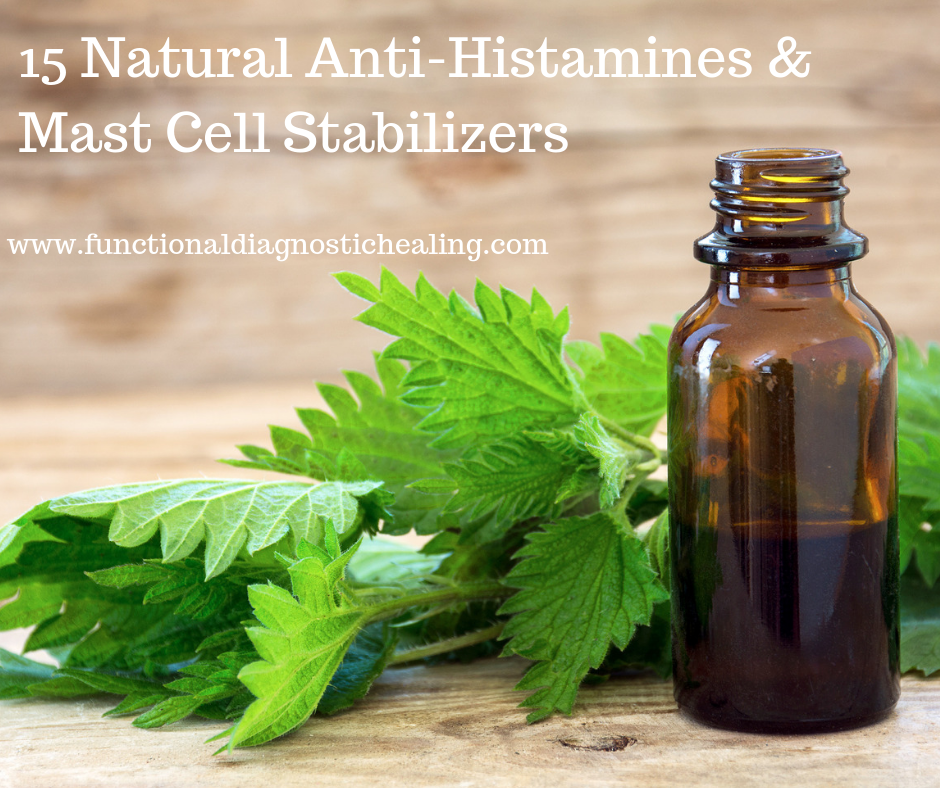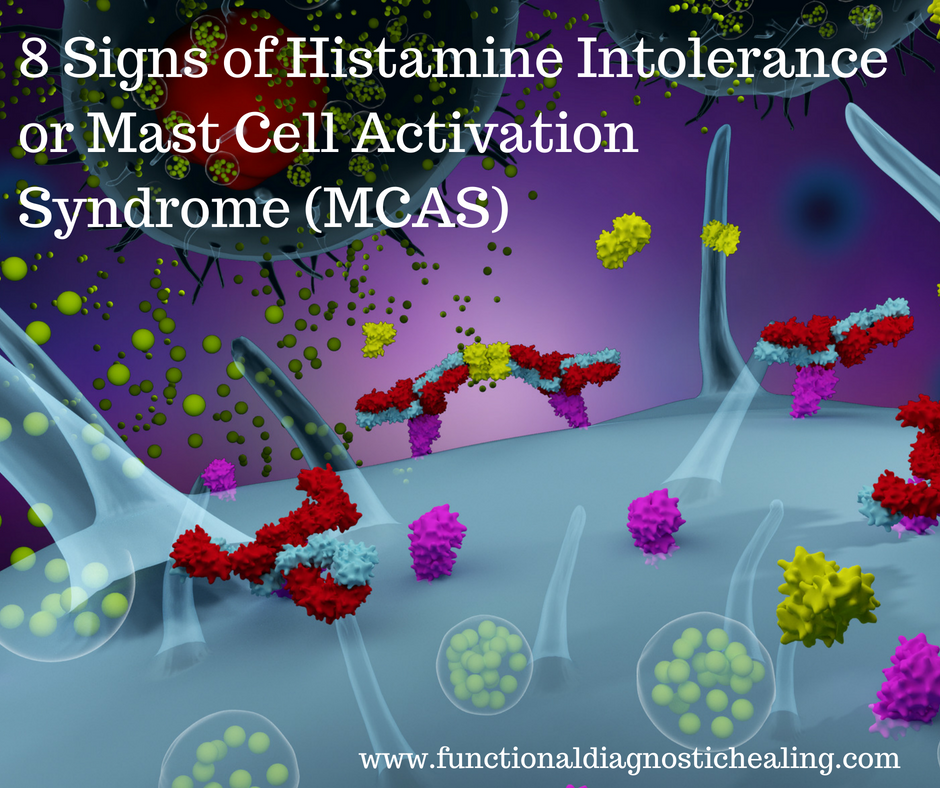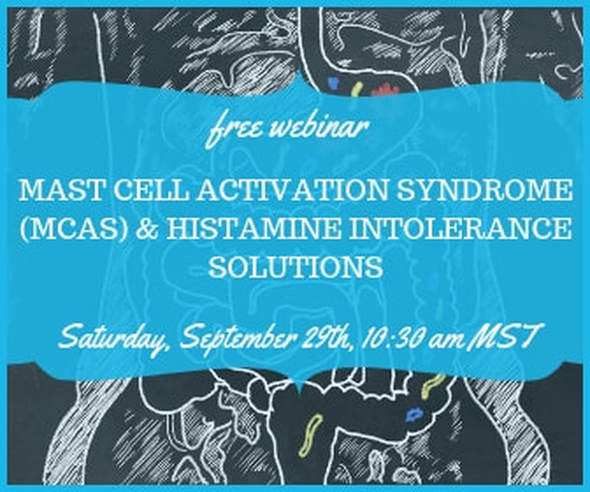|
In functional medicine, we always want to be looking upstream and trying to gather as many clues and evidence through testing and intake to determine what is at the root cause of the chronic symptoms in question. We then work to treat and resolve the underlying problem(s) and this helps to reduce symptoms and restore health long term. But what happens when someone is reacting to or not tolerating the treatment needed to resolve their root cause problems? This is the biggest challenge I see for those who have MCAS and histamine intolerance. Their immune systems are so hyper-reactive and overly sensitive that they will often have trouble tolerating the treatment needed to resolve the root cause issues like parasites, lyme, SIBO, retroviruses, or mold. I experienced this personally when I was being treated for Lyme disease and mold illness aggressively for 2 years before knowing that MCAS was playing a role in my symptoms. My MCAS manifested as extreme body pain, even after 2 years of Lyme disease treatment my pain wasn't getting any better, in fact, it was getting worse!! I also found myself becoming very sensitive and reactive to foods, smells, chemicals, EMF's, and even most of the medications and supplements that were treating my illness. I could not tolerate treatment and was just getting sicker and feeling worse. Figuring out I had MCAS and adding in both pharmaceutical and natural anti-histamines and mast cell stabilizers was a game changer for me. My pain levels dropped slowly, my energy improved, my rashes disappeared and my food reactions lessened. Overtime I finally started to be able to tolerate the treatment I needed to resolve my root causes. After my personal experience and professionally working with lots of mast cell clients, I now understand that its imperative to get the immune system to calm down and be less reactive before you will be able to tolerate treatment for and resolve what's at the root cause of your MCAS. My practice is now 90% MCAS patients and every client is unique in what combination of anti-histamines and mast cell stabilizers work to calm down the immune response and be less reactive. I use special lab testing to help give me clues about each clients bio-individual triggers, metabolism, and root cause issues. This helps me make educated recommendations in the area of natural anti-histamines and mast cell stabilizers that will work for each personal individually. There are some nuances to choosing the right combination of supplements and it often takes some trail and error. This is why I highly recommend working with a practitioner who knows and understands this well to help guide your choices. You will want to choose clean formulations with minimal or no fillers. I suggest single active ingredient items so that you know what is helping or hurting you. If you are someone who has food reactions, you will want to time these items to be taken 15-30 minutes prior to meals. This timing can help to reduce post meal time mast cell reactions. Lastly, never try more than one of these at the same time. Always try anything that is new to you alone with no other changes or adjustments in food or medications, titrate up to the recommended dose (or your tolerated dose) slowly and then add the next item. I typically recommend a 3 day trial before increasing the dose or adding the next supplement. Here are the natural options that I use most in my practice... 15 Natural Anti-Histamines & Mast Cell Stabilizers:
These go-to, natural mast cell stabilizers can be used in combination with pharmaceuticals like ketotifen, cromolyn, singular, and over the counter anti-histamines like Benadryl if needed. I highly recommend working with an experienced practitioner who can help you choose the products that meet your needs best. Always keep in mind these anti-histamines and mast cell stabilizers are not going to fix the underlying, or root problem(s) that are causing the MCA symptoms. They will simply help to lower reactions and calm the immune response down so that you can start to treat the underlying reasons your mast cells are over-stimulated in the first place. If you want to learn more about my approach for reducing MC reactions and improving root cause treatment tolerance and effectiveness, check out my free online webinar. References:
50 Comments
It's been almost 10 years since the onset of the my chronic Lyme disease symptoms following a car accident in 2008 and I can't believe the roller coaster this journey has taken me on! Looking back, there were a few key discoveries and turning points that really shifted my healing into the next level and allowed me to make significantly more progress.
One of those things was figuring out that I was suffering from Mast Cell Activation Syndrome (MCAS). Mast cells are a type of immune cell that are present in almost all tissues in the human body but especially in the gut lining, connective tissue, cardiovascular system, respiratory system, and nervous system. They are part of an allergic response used to protect us from injury or threat. When mast cells encounter a "threat or perceived threat" they release chemical mediators like histamine, leukotrienes, interleukins, prostaglandins, and cytokines. These mediators are like signals to the immune system - you can think of them like a fire alarm, letting the fireman know its time to fight a fire. The mediators are a signal to the immune system that there is threat or injury that needs healing or addressing. We all need mast cells in times of allergic response or injury to heal, however in MCAS, your mast cells are hyper-stimulated and over-activated, releasing large amounts of mediators and setting the stage for chronic immune activation and autoimmunity along with a host of pretty serious multi-systemic symptoms. My MCAS manifested as extreme body pain, even after 3 years of Lyme disease treatment my pain wasn't getting any better, in fact, it was getting worse!! I also found myself becoming very sensitive and reactive to foods, smells, chemicals, EMF's, and even most of the medications and supplements that were supposed to be helping me feel better. I would have constant migraine headaches, my heart would race and my body would feel hot and in terrible pain after I would eat a meal. I was down to like 5 or 6 foods that I could eat without having a reaction. It was incredibly frustrating and I felt so stuck!! When I started to get rashes all over my body (which I had never had prior), my new functional doctor at the time suspected MCAS and we added some anti-histamine and mast cell stabilizers into my protocol. Her suspicion was confirmed when after a month or so, I slowly started to stabilize, my pain dropped a noticeable amount, and I was having less migraines. This is when I took a deep dive into researching and understanding not only the manifestations of MCAS and how to get the immune system to calm down and act normally but also identifying the root causes behind this type of immune activation. The protocols I've implemented based on my research have helped me to accelerate my recovery and live a much more functional life while I continue to heal from chronic Lyme disease. I find that MCAS is a very common condition in the chronically ill and especially so for patients who have not responded to standard treatment protocols well. I've now worked with dozens and dozens of people who suffer from this type of immune dysfunction and I want to help you as well! So how do you know if MCAS might be playing a role in your illness? Here are some clear symptoms to look for... 9 Signs You May Be Dealing with MCAS or Histamine Intolerance:
How Does MCAS Differ from Histamine Intolerance? Histamine intolerance is a term that you may have heard more commonly than MCAS and is typically categorized as someone who is histamine sensitive specifically due to a genetic mutation in which they have a deficiency in the enzyme (DAO) needed to break down histamine in the gut. This causes histamine levels build up and people start reacting to high histamine foods or to environmental stimulus easily. Excess histamine is the main problem here. In MCAS, the mast cells are being over activated which is causing the release of more than just histamine but other mediators as well like cytokines, leukotrienes, interleukins, and prostaglandins. Testing & Treatment to Consider for MCAS: Standard testing includes serum and urine analysis inlcuding: Serum Tryptase, Serum ChromograninA, Whole Blood Histamine (chilled plasma) Heparin (chilled plasma), N-Methylhistamine (24hr urine), and Prostaglandin F2alpha (24hr urine). But again, these tests are not very accurate and will often give a false negative picture. That's why its a clinical diagnosis based on the presence of the symptoms above in at least two body systems and a positive response or symptom reduction with anti-histamines and/or mast cell stabilizers. Next week's blog post will be spent discussing the anti-histamine and mast cell stabilizer options along with tips on how to find the right combination of medications/supplements to help reduce over-active mast cells and get symptom relief. I will also share important steps to take, outside of medications and supplements, that will help to reduce your mast cell reactions and help you get your life back! I look forward to catching you all next week! Thanks for tuning in! Billie P.S. - You may also be interested in my Free, Live Webinar, Mast Cell Activation Solutions, which is scheduled for Saturday, 9/29 at 10:30am MT. Click the image below to learn more or sign up. |
Billie Shellist, FDN-P
I practice functional nutrition, an approach that allows me to look at your entire health history and help you find the "root causes" of your chronic health complaints. This cuts out the trial and error process and helps you get real symptom relief and resolution! Food is medicine and knowledge is power -I hope you enjoy my anti-inflammatory recipes which are gluten, dairy, and soy free as well as very low grain and sugar. If you'd like to heal from the root cause(s) of your chronic symptoms, try starting with a complimentary 15-minute consultation. Click here to request your free session. |




